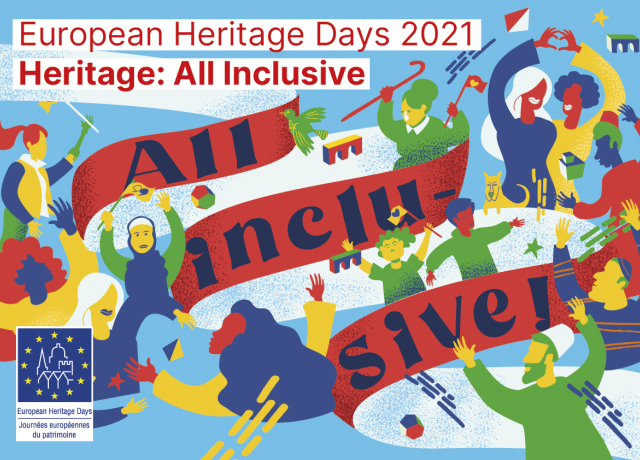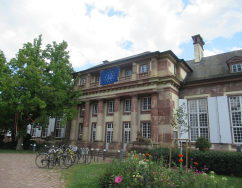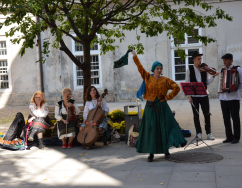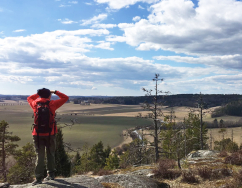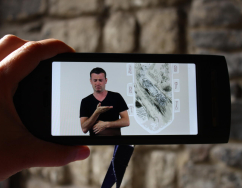European Heritage Days Themes Announced Across Europe
European Heritage Days Themes Announced Across Europe
Iceland Celebrates With Everyone!
The Icelandic Cultural Heritage Days – Menningarminjadagarnir – will be taking part in Heritage: All Inclusive through its ‘With Everyone!’ - Allir með! - week. Iceland’s participation is designed to reinforce the principles of European Heritage Days; raising awareness of the diverse cultures of Europe, promoting tolerance and understanding across borders and cultures, and educating the public about the importance of protecting cultural heritage.
Taking place between 30th August – 5th September, sites including museums, national parks, historic buildings and gardens have been encouraged to participate in the theme, and take inspiration from the Heritage: All Inclusive brochure. Events are expected across the country, from Reykjavík to the East fjords, and from the Northern coastline to the Southern Peninsula.
Last year, in response to Covid-19, the programme was exclusively digital, with events and presentations taking place online. Previous events from other years have included a festival dedicated to Viking ironwork at Eiríksstaðir, walks around Skálanes in Seyðisfjörður looking at the connection between cultural heritage and nature, and a guided tour of the 1940s Patterson Airport in Reykjanes. This year’s events will be announced soon – events will be open to everyone and free of charge!
Ireland: Heritage Newcomers
This year’s National Heritage Week in Ireland will be looking to hear new voices as part of its Heritage Newcomers theme. Programme Coordinators are inviting individuals, families and communities who have not previously been involved to work on a heritage project, which can be anything from sharing traditional songs to researching personal histories.
Heritage Newcomers focuses on the concept of ‘heritage sharing’, which aims to connect people who may not otherwise feel included in local history, as well as providing an opportunity to explore aspects of heritage which are seldom considered or celebrated. Organisers will be asked to reach out to new groups and individuals to get involved and assess how events can be made more accessible for people with a sensory or physical disability. The theme will also look to include those of all ages with intergenerational activities, such as crafts or cookery, which can engage both younger and older generations together. While a special ‘Wild Child’ day on 18 August will particularly focus on encouraging kids and families to get outside, explore the great outdoors and discover the heritage in their local area.
The theme will also reflect the appreciation of local sites which have become more familiar to people during the past year of travel restrictions and lockdowns. Heritage assets such as local landmarks and buildings, as well as natural environments such as land formations will be highlighted. Taking place on August 22nd, a special Water Heritage Day will also uncover Ireland’s history as an island nation and explore how the country has been shaped by the sea and its rivers, lakes and wetlands.
National Heritage Week will take place from August 14th – 22nd and projects can be submitted via the website portal until August 30th.
Germany: Existence and Appearance
This year’s theme in Germany will be Sein & Schein: Existence and Appearance - in History, Architecture and Monument Preservation. This topic will highlight the aesthetics of art and architecture, with a particular focus on optical illusions, from the Baroque to the present day. Programme Coordinators are hoping to inspire visitors with the hidden surprises of the country’s monuments, and through encouraging everyone to take a second look at features which only reveal their visual secrets on close inspection.
Illusions will include wall and ceiling paintings which create a sense of depth or perspective, such as false domes which visually expand the size of rooms, false facades which can simulate details such as windows or columns, and grisaill painting which uses a rage of grey tones to convincingly replicate statues and other moulding details. Other illusions will look at the materials used in construction, such as stucco imitating marble and ashlar plaster appearing as stonework, with the theme also considering how these historic techniques can feed into current debates on reconstruction and conservation work.
The events will launch in Lutherstadt Wittenberg with a music concert in collaboration with the Deutschlandfunk radio network. A variety of both on-site and digital activities will also be taking place across the country, with visitors encouraged to take part in a photography competition to capture their personal interpretation of the theme.
The Open Monument Day - Tag des offenen Denkmals - will take place on 12 September, and you can register interest in becoming an event organiser until 31 May.
Slovenia: Bon Appetit
The Bon Appetit - Dober Tek - theme in Slovenia this year will be all about food, with events showcasing everything from agriculture to the dining experience itself. The theme has been chosen after the country was named the European Gastronomic Region 2021 by the International Institute of Gastronomy, Culture, Arts and Tourism (IGCAT). It will highlight the country’s unique culinary culture and heritage, which – as explained in the publication Taste Slovenia - spans a diverse area of gastronomy traditions from the Alps to the Mediterranean Sea and the Pannonian Plain.
Events will demonstrate knowledge and skills as well as customs and habits across a huge range of food-related topics, from production and sale to cooking and eating. Traditional recipes and festive dishes will be revealed, while buildings such as markets, granaries, kitchens and inns will open to explain their role in the food production chain. The programme will also look at the development of the country’s culinary history, from the first agricultural tools, through to preparation techniques, early cookbooks and the development of modern dining ware, while also looking to the future and the innovations promoting health and sustainability.
The festival will take place from 25 September to 9 October, and events can be submitted online until May 7th.
